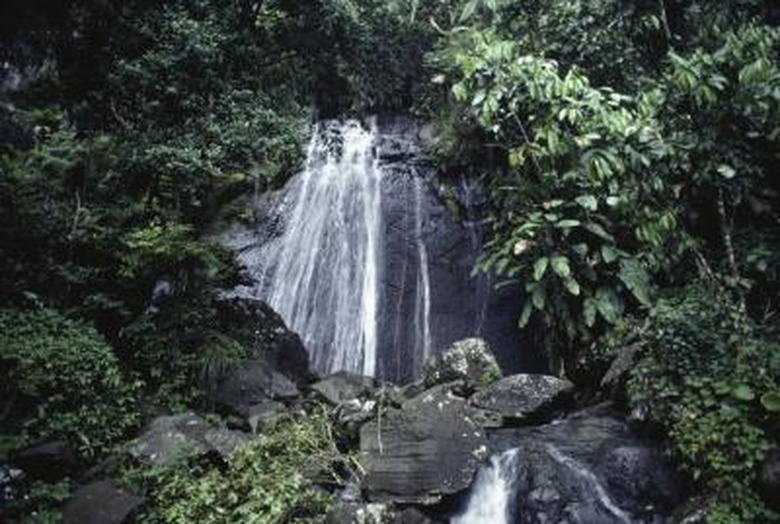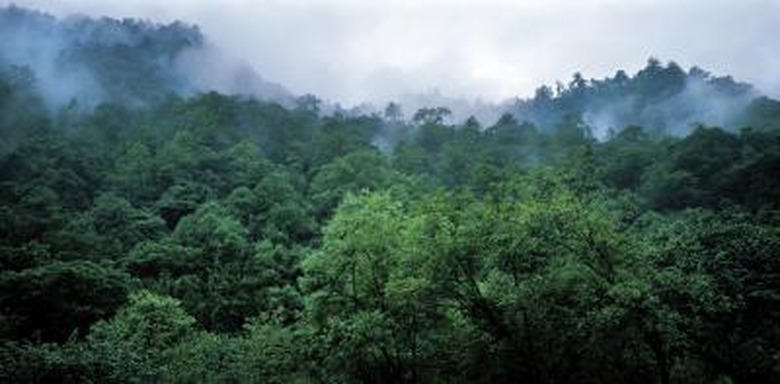The Importance Of The Forest Ecosystem
The world's forests hold importance for all of their inhabitants as well as for the overall health of the planet. The benefits of forests to society and to the diversity of life make it vital that they be protected from deforestation and other potential negative impacts of civilization.
Types of Forests
Types of Forests
Forests thrive in diverse climatic regions throughout the world, and can be categorized by their locations and elevations.
\(Tropical: lush, dense forests found near the equator. They are vital storehouses of the planet's biodiversity.\)
\(Sub-tropical: consists of trees that can resist the summer drought.They are found to the north and south of the tropical forests.\)
\(Mediterranean: located to the south of the temperate regions and made up primarily of evergreen trees.\)
\(Temperate: mix of coniferous evergreen and deciduous trees found in North America, northeastern Asia and Europe.\)
\(Coniferous: These forests are found around the poles in cold, windy regions and contain both conifers and hardwoods.\)
\(Montane: also known as cloud forests. Contain mainly conifers and are found in high-elevation tropical, sub-tropical and temperate zones.\)
Climate
Climate
Forests are major contributors to the Earth's ability to maintain its climate, by the global impact of their photosynthesis. They are a natural defense against climate change, removing the greenhouse gas carbon dioxide and generating oxygen. This assists in purifying the atmosphere and controlling rising temperatures. Deforestation negates these benefits.
Ecology
Ecology
In addition to assisting in climate control, forests have other ecological benefits. They prevent erosion by reducing the rainfall's force on the soil's surface and by absorbing water and not allowing it to directly run off and remove topsoil. Forests also act as water filters, collecting and storing water and recharging underground aquifers. Tropical montane forests are especially important to watersheds. Forests also increase the atmosphere's humidity by transpiration, which affects temperature and rainfall.
Biodiversity
Biodiversity
Forests contain a greater range of biodiversity than any other ecosystems on earth. Only a fraction of the species found in forests have been examined and studied. A single massive tree in the Amazon rainforest can be home for thousands of species. The wide variety of trees and plants found in tropical forests comprises particularly intensive biodiversity. This biodiversity is be important on its own terms in ways we may not currently understand, as interdependent species have evolved over millions of years to interact and flourish.
Commercial Importance
Commercial Importance
Humankind derives many benefits from forest ecosystems. Many medicines and pharmaceuticals have been discovered in plants native to forests. Local communities survive on plants and animals culled from the forests. Products that modern society depends on such as wood, paper and bamboo all originate from forest ecosystems. Many other desirable products such as spices, gums and dyes are also found in forests around the globe. Forests are important to humans for aesthetic reasons as well, and ecotourism is one way to use and promote the protection of forests in a sustainable manner.
Cite This Article
MLA
Agar, Robert. "The Importance Of The Forest Ecosystem" sciencing.com, https://www.sciencing.com/importance-forest-ecosystem-5422707/. 22 November 2019.
APA
Agar, Robert. (2019, November 22). The Importance Of The Forest Ecosystem. sciencing.com. Retrieved from https://www.sciencing.com/importance-forest-ecosystem-5422707/
Chicago
Agar, Robert. The Importance Of The Forest Ecosystem last modified August 30, 2022. https://www.sciencing.com/importance-forest-ecosystem-5422707/





